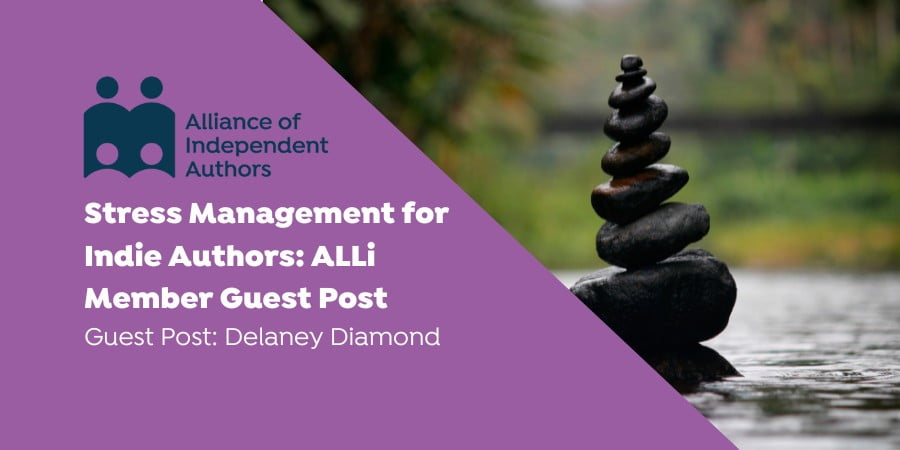
Photo by Max van den Oetelaar on Unsplash
This week Delaney Diamond, Alliance of Independent Authors member, fiction writer and author-productivity advocate, shares her advice for stress management for indie authors.
Members have also shared their top stress-reduction tips through our new ALLi member forum SelfPubConnect – with advice ranging from piano playing to yoga. Read on for practical steps to improve your well-being and build a sustainable author career.
Stress Management for Indie Authors
Stress. Such a small word, only six letters, but it can cause major problems.
Stress, for most of us, is an inevitable part of life. But too much stress can manifest by affecting our mental and physical states.
The ups and downs of life as an author can in turn lead to an increase in stress levels. So, how do we stay on top of it? By recognizing the signs and symptoms, so we can manage its impact on our overall well-being.
What is Stress?
According to WebMD, “Stress is your body’s reaction to pressure from a certain situation or event. It can be a physical, mental, or emotional reaction.”
The World Health Organization (WHO) has a similar definition: “Stress can be defined as a state of worry or mental tension caused by a difficult situation.”
Does any of this sound familiar to you?
We’ve all experienced stress, which can stem from a number of sources, including relationships, financial worries, health issues, and of course our work.
As authors, our work is not limited to writing. If it was, that would be wonderful, but being an indie author includes marketing, uploading books, taking classes, formatting files, editing, bookkeeping, social media, the list goes on. You may also have other roles alongside your writing to balance. All of those tasks can pile up and cause overwhelm, or for some, even burnout. These are simply alternative words for stress.
Stress triggers a surge of hormones like adrenaline and cortisol in our bodies to prepare us for a perceived threat. The problem is, too much of it, and it can lead to negative effects on both our mental and physical health. When we’re not feeling our best, it affects our ability to write, which in turn affects our ability to make a living.
The Physical Toll of Stress
Prolonged exposure to stress hormones can result in increased blood pressure, heart rate, and heightened muscle tension. When sustained over time, these physiological changes can contribute to a range of health problems.
From cardiovascular issues like hypertension and heart disease to digestive problems such as ulcers or irritable bowel syndrome. Your immune system might even weaken under chronic stress, making you more susceptible to infections and illnesses.
Recognizing the Telltale Signs
It’s important to recognize the signs of stress to lessen its impact. Different people will have different symptoms, but here are some to watch out for:
Physical Symptoms: headaches, chronic pain, muscle tension, fatigue, disturbed sleep patterns.
Emotional Signs: irritability, anxiety, or feeling overwhelmed, a persistent sadness or a sense of hopelessness.
Behavioral Signs: increased irritability, overeating or loss of appetite, increased use of substances like alcohol or tobacco, withdrawal from social interactions.
Cognitive Effects: difficulty concentrating, memory problems, racing thoughts.
Whew! That’s a lot and it’s alarming. Did any of those symptoms hit home for you?
I definitely recognized myself in some of them. Pain and muscle tension in particular were how I realized I was suffering from the effects of stress in my pre-writing career, and to be honest, at first I didn’t know stress was the problem. I simply wanted to know what was wrong with me.
But it’s not enough to identify the problem. Managing this burdensome issue is the next step, and fortunately within our control. Specific lifestyle changes can significantly reduce stress levels and promote overall well-being, and below are four strategies to help do just that.
Engage in Regular Exercise
I’m sure this doesn’t come as a surprise. In general, we know exercise is good for our health, and physical activity is a powerful antidote to all manner of ills. Regular exercise not only enhances physical health but improves our mental health, as well.
The act of exercising triggers the release of endorphins, the body's natural mood elevators, which creates a sense of well-being and alleviates stress. Even a daily thirty-minute commitment to activities such as walking, jogging, yoga, or dancing can significantly reduce stress levels.
According to the Better Health Channel, sitting is the new smoking. In fact, sitting for hours at a time can increase heart disease, diabetes and some cancers.
It’s hard to stop writing when you’re in the zone, but it’s important to remember to move, simply because we, as writers, remain seated so much. When you’re writing, set a timer to remind yourself to get up every thirty minutes to an hour. Use that time to go for a short walk or do some stretches.
Just remember to consult your physician before engaging in any exercise program.

Photo by Matteo Di Iorio on Unsplash
ALLi Member Jerry Vanschaik finds yoga helps his stress levels:
I practice yoga and exercise and some meditations to create good mental energy. But, I also like to “release” what I've done the day before. It helps create room to hit the laptop day after day.
And John Straughn agrees that exercise can help, along with taking time for relaxation when tired:
Walking, and lots of it, is my favorite stress buster. And later in the evening, when I'm too tired to do anything else, I like to wind down with TV.
Get Enough Sleep
If you’re a night owl like me, this one is tough. But the truth is, adequate sleep plays an important role in overall health, and sleep deprivation increases stress levels and compromises the body's ability to cope with challenges.
But sleeping is not limited to night time. I’ve been known to take a nap during the day, as needed. A nap can be reenergizing and allow you to plow through those edits or provide clarity if you’re stuck on a plot point.
Bottomline, quality sleep allows the body and mind to rest, recover, and recharge. Therefore, we should all establish a consistent sleep schedule, cultivate a relaxing bedtime routine, and create a comfortable sleep environment to improve sleep quality.
Easier said than done, but look at it this way. Sleep deprivation is one of the methods used to break aspiring Navy SEALs during Hell Week. Unless you’re training for the SEALs, get enough sleep. Your mind and body will thank you for it.

Holly Greenland
ALLi Member and Blog Editor, Holly Greenland, finds sleep is important for her well-being:
Sleep is a big one for me. Everything feels worse in the night. I heard a tip that if you wake up in the night and can’t seem to turn off, get up and walk on a cold floor (which means in the kitchen for me) before going back to bed. This can help end any spiralling thoughts, and reset your mind before you head back off to sleep.
Eat a Balanced Diet
When we’re in the writing cave and pushing hard to meet a deadline, it’s easy to let good eating habits slip away. We might fall into the bad habit of snacking or eating processed foods that affect our mood and energy level.
Instead, we should opt for a balanced diet of fruits, vegetables, whole grains, and lean proteins, which enable us to receive the essential nutrients we need to support overall health and reduce stress. We should also limit refined sugars and make sure to consume lots of water throughout the day, all of which contribute to stress management and help us maintain optimal body function to write those gripping tales readers love.
An easy way to stay on track with good eating habits is to meal prep. Divide your ingredients for a complete smoothie (fruits, chia seeds, protein powders, etc.) into separate sandwich bags and freeze. During the week, pull a bag from the freezer, empty it into the blender, and add your liquid of choice for a quick and nutritious breakfast—or snack – for when you take a break from writing.
Lunch and dinner can be equally easy. I often chop vegetables like onions and peppers ahead of time to use during the week, and if you don’t mind eating the same meal multiple times, batch cook and keep individual servings in the refrigerator to eat for lunch. Freeze pastas and casseroles and heat them in the oven when you’re ready for dinner.
Time Management: Organize, Prioritize, and Delegate
Effective time management is important to reducing stress. Prioritizing tasks, setting attainable goals, and organizing daily schedules instills a sense of control and diminishes feelings of being overwhelmed.
Delegate responsibilities when feasible. Perhaps you could contract with an author assistant to help with tasks such as social media management or preparing your monthly newsletter.
Practice the art of saying no to additional commitments. Do you really have time to write a novella for that anthology? Can you truly afford—in terms of time and money—to go to another conference?
I’m a big fan of using Google Calendar and Google Tasks. I write for an hour and a half to two hours in the mornings, and I prioritize that time by blocking it on my calendar. I use Google Tasks to list activities such as responding to comments on social media, creating teasers, and bookkeeping.
I don’t know about you, but there’s something very satisfying about seeing that line through an item on my task list and knowing that means it’s completed.
More top stress-busting tips from ALLI Members

Debbie Young, ALLi Ambassador
ALLi member and Ambassador Debbie Young shares her tips, from playing music to morning reading and ‘have done’ lists:
I play the piano every day, usually before starting work, and sometimes in the course of the day if I'm feeling particularly stressed. It is very helpful because I'm not especially good at it and I have to concentrate hard on reading the piano music, which stops me thinking about work!
I also read voraciously, usually before breakfast, which is a very grounding practice that I started during lockdown. (I've always read a lot, across multiple genres, but previously in the evening.) When lockdown stopped, I thought I'd go back to reading in the evening, but I missed the sound start it gave to my day so now do it every day.
Plus this year I've started keeping a diary of what I've accomplished each day – a sort of “have done” list, as opposed to a to-do list, which always makes me realize I've done more than I thought I had, and it puts what I haven't done into perspective!
ALLi member Lynne Jorritsma says taking a ‘step back’ is also a way forward:
I think the most important thing when dealing with the stresses that come with the life of an indie author is to force yourself to take a step back. It's essential to go for that daily walk (even if it's just for ten minutes) or to sit down with a book just for fun.
You need to remember that if you look after yourself in a better way, your mind thinks more clearly and then everything benefits. Take your wellbeing seriously.
Conclusion
When we learn to identify and manage stress, we not only ensure that our bodies are in good shape, we safeguard our mental health. As creatives, that’s crucial to our success, as our minds are the source of the words that enable us to have a sustainable author career.
If you have suggestions for managing stress, share them below or in the ALLi Member SelfPubConnect Forum. I’m always looking for ideas!
Sources:
- WebMD – Stress Management
- American Psychological Association – Stress
- Better Health Channel – The Dangers of Sitting
Delaney Diamond Author Avatar
Guest Blogger Bio: Delaney Diamond
Delaney Diamond is the USA Today Bestselling Author of more than 50 contemporary romance and romantic suspense novels, and dozens of romance short stories. When she's not spinning tales of romantic fiction, she enjoys learning about time management and ways to increase productivity. She also posts regular blogs about what she learns, including tips and techniques to help her fellow indie authors save time and improve their processes to attain the elusive work-life balance we all crave.
Find out more
 If you are looking for more mindset support and advice, take a look at our post exploring how to build a ‘positive money mindset' for indie authors. With activities, tips and tricks for embracing the financial side of your author business and information about the opportunities and challenges financial management can bring: Embracing a positive money mindset
If you are looking for more mindset support and advice, take a look at our post exploring how to build a ‘positive money mindset' for indie authors. With activities, tips and tricks for embracing the financial side of your author business and information about the opportunities and challenges financial management can bring: Embracing a positive money mindset
Thoughts or further questions on this post or any self-publishing issue?
 If you’re an ALLi member, head over to the SelfPubConnect forum for support from our experienced community of indie authors, advisors, and our own ALLi team. Simply create an account (if you haven’t already) to request to join the forum and get going.
If you’re an ALLi member, head over to the SelfPubConnect forum for support from our experienced community of indie authors, advisors, and our own ALLi team. Simply create an account (if you haven’t already) to request to join the forum and get going.
Non-members looking for more information can search our extensive archive of blog posts and podcast episodes packed with tips and advice at ALLi's Self-Publishing Advice Centre.




